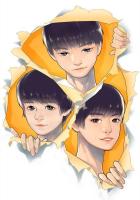(ll. 17-19) Hail to you, lord! Freely bestow on me substance that cheers the heart. And now that I have begun with you, Iwill celebrate the race of mortal men half-divine whose deeds the Muses have showed to mankind.
XXXII. TO SELENE (20 lines)
(ll. 1-13) And next, sweet voiced Muses, daughters of Zeus, well-skilled in song, tell of the long-winged (35) Moon. From her immortal head a radiance is shown from heaven and embraces earth;and great is the beauty that ariseth from her shining light. The air, unlit before, glows with the light of her golden crown, and her rays beam clear, whensoever bright Selene having bathed her lovely body in the waters of Ocean, and donned her far-gleaming, shining team, drives on her long-maned horses at full speed, at eventime in the mid-month: then her great orbit is full and then her beams shine brightest as she increases. So she is a sure token and a sign to mortal men.
(ll. 14-16) Once the Son of Cronos was joined with her in love;and she conceived and bare a daughter Pandia, exceeding lovely amongst the deathless gods.
(ll. 17-20) Hail, white-armed goddess, bright Selene, mild, bright-tressed queen! And now I will leave you and sing the glories of men half-divine, whose deeds minstrels, the servants of the Muses, celebrate with lovely lips.
XXXIII. TO THE DIOSCURI (19 lines)
(ll. 1-17) Bright-eyed Muses, tell of the Tyndaridae, the Sons of Zeus, glorious children of neat-ankled Leda, Castor the tamer of horses, and blameless Polydeuces. When Leda had lain with the dark-clouded Son of Cronos, she bare them beneath the peak of the great hill Taygetus, -- children who are delivers of men on earth and of swift-going ships when stormy gales rage over the ruthless sea. Then the shipmen call upon the sons of great Zeus with vows of white lambs, going to the forepart of the prow; but the strong wind and the waves of the sea lay the ship under water, until suddenly these two are seen darting through the air on tawny wings. Forthwith they allay the blasts of the cruel winds and still the waves upon the surface of the white sea: fair signs are they and deliverance from toil. And when the shipmen see them they are glad and have rest from their pain and labour.
(ll. 18-19) Hail, Tyndaridae, riders upon swift horses! Now Iwill remember you and another song also.
ENDNOTES:
(1) ll. 1-9 are preserved by Diodorus Siculus iii. 66. 3; ll.
10-21 are extant only in M.
(2) Dionysus, after his untimely birth from Semele, was sewn into the thigh of Zeus.
(3) sc. Semele. Zeus is here speaking.
(4) The reference is apparently to something in the body of the hymn, now lost.
(5) The Greeks feared to name Pluto directly and mentioned him by one of many descriptive titles, such as `Host of Many':
compare the Christian use of O DIABOLOS or our `Evil One'.
(6) Demeter chooses the lowlier seat, supposedly as being more suitable to her assumed condition, but really because in her sorrow she refuses all comforts.
(7) An act of communion -- the drinking of the potion here described -- was one of the most important pieces of ritual in the Eleusinian mysteries, as commemorating the sorrows of the goddess.
(8) Undercutter and Woodcutter are probably popular names (after the style of Hesiod's `Boneless One') for the worm thought to be the cause of teething and toothache.
(9) The list of names is taken -- with five additions -- from Hesiod, "Theogony" 349 ff.: for their general significance see note on that passage.
(10) Inscriptions show that there was a temple of Apollo Delphinius (cp. ii. 495-6) at Cnossus and a Cretan month bearing the same name.
(11) sc. that the dolphin was really Apollo.
(12) The epithets are transferred from the god to his altar `Overlooking' is especially an epithet of Zeus, as in Apollonius Rhodius ii. 1124.
(13) Pliny notices the efficacy of the flesh of a tortoise against withcraft. In "Geoponica" i. 14. 8 the living tortoise is prescribed as a charm to preserve vineyards from hail.
(14) Hermes makes the cattle walk backwards way, so that they seem to be going towards the meadow instead of leaving it (cp. l. 345); he himself walks in the normal manner, relying on his sandals as a disguise.
(15) Such seems to be the meaning indicated by the context, though the verb is taken by Allen and Sikes to mean, `to be like oneself', and so `to be original'.
(16) Kuhn points out that there is a lacuna here. In l. 109 the borer is described, but the friction of this upon the fireblock (to which the phrase `held firmly' clearly belongs) must also have been mentioned.
(17) The cows being on their sides on the ground, Hermes bends their heads back towards their flanks and so can reach their backbones.
(18) O. Muller thinks the `hides' were a stalactite formation in the `Cave of Nestor' near Messenian Pylos, -- though the cave of Hermes is near the Alpheus (l. 139). Others suggest that actual skins were shown as relics before some cave near Triphylian Pylos.
(19) Gemoll explains that Hermes, having offered all the meat as sacrifice to the Twelve Gods, remembers that he himself as one of them must be content with the savour instead of the substance of the sacrifice. Can it be that by eating he would have forfeited the position he claimed as one of the Twelve Gods?
(20) Lit. `thorn-plucker'.
(21) Hermes is ambitious (l. 175), but if he is cast into Hades he will have to be content with the leadership of mere babies like himself, since those in Hades retain the state of growth -- whether childhood or manhood -- in which they are at the moment of leaving the upper world.
(22) Literally, `you have made him sit on the floor', i.e. `you have stolen everything down to his last chair.'
(23) The Thriae, who practised divination by means of pebbles (also called THRIAE). In this hymn they are represented as aged maidens (ll. 553-4), but are closely associated with bees (ll. 559-563) and possibly are here conceived as having human heads and breasts with the bodies and wings of bees.
See the edition of Allen and Sikes, Appendix III.















